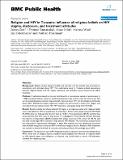| dc.contributor.author | Zou, James Yang | |
| dc.contributor.author | Yamanaka, Yvonne | |
| dc.contributor.author | John, Muze | |
| dc.contributor.author | Watt, Melissa | |
| dc.contributor.author | Ostermann, Jan | |
| dc.contributor.author | Thielman, Nathan | |
| dc.date.accessioned | 2010-10-25T15:32:01Z | |
| dc.date.issued | 2009 | |
| dc.identifier.citation | Zou, James, Yvonne Yamanaka, Muze John, Melissa Watt, Jan Ostermann, and Nathan Thielman. 2009. Religion and HIV in Tanzania: influence of religious beliefs on HIV stigma, disclosure, and treatment attitudes. BMC Public Health 9:75. | en_US |
| dc.identifier.issn | 1471-2458 | en_US |
| dc.identifier.uri | http://nrs.harvard.edu/urn-3:HUL.InstRepos:4506435 | |
| dc.description.abstract | Background: Religion shapes everyday beliefs and activities, but few studies have examined its associations with attitudes about HIV. This exploratory study in Tanzania probed associations between religious beliefs and HIV stigma, disclosure, and attitudes toward antiretroviral (ARV) treatment. Methods: A self-administered survey was distributed to a convenience sample of parishioners (n = 438) attending Catholic, Lutheran, and Pentecostal churches in both urban and rural areas. The survey included questions about religious beliefs, opinions about HIV, and knowledge and attitudes about ARVs. Multivariate logistic regression analysis was performed to assess how religion was associated with perceptions about HIV, HIV treatment, and people living with HIV/AIDS. Results: Results indicate that shame-related HIV stigma is strongly associated with religious beliefs such as the belief that HIV is a punishment from God (p < 0.01) or that people living with HIV/AIDS (PLWHA) have not followed the Word of God (p < 0.001). Most participants (84.2%) said that they would disclose their HIV status to their pastor or congregation if they became infected. Although the majority of respondents (80.8%) believed that prayer could cure HIV, almost all (93.7%) said that they would begin ARV treatment if they became HIV-infected. The multivariate analysis found that respondents' hypothetical willingness to begin ARV treatme was not significantly associated with the belief that prayer could cure HIV or with other religious factors. Refusal of ARV treatment was instead correlated with lack of secondary schooling and lack of knowledge about ARVs. Conclusion: The decision to start ARVs hinged primarily on education-level and knowledge about ARVs rather than on religious factors. Research results highlight the influence of religious beliefs on HIV-related stigma and willingness to disclose, and should help to inform HIV-education outreach for religious groups. | en_US |
| dc.description.sponsorship | Engineering and Applied Sciences | en_US |
| dc.language.iso | en_US | en_US |
| dc.publisher | BioMed Central | en_US |
| dc.relation.isversionof | doi://10.1186/1471-2458-9-75 | en_US |
| dc.relation.hasversion | http://www.ncbi.nlm.nih.gov/pmc/articles/PMC2656538/pdf/ | en_US |
| dash.license | OAP | |
| dc.title | Religion and HIV in Tanzania: influence of religious beliefs on HIV stigma, disclosure, and treatment attitudes | en_US |
| dc.type | Journal Article | en_US |
| dc.description.version | Version of Record | en_US |
| dc.relation.journal | BMC Public Health | en_US |
| dash.depositing.author | Zou, James Yang | |
| dc.date.available | 2010-10-25T15:32:01Z | |
| dc.identifier.doi | 10.1186/1471-2458-9-75 | * |
| dash.contributor.affiliated | Zou, James | |


